The gals spent the morning shopping for household supplies, a huge fry pan, big soup pots, cutting boards, and a blender. Fresh food and protein are hard to come by for us vegetarian foreigners–especially when there are eight hungry mouths to feed.
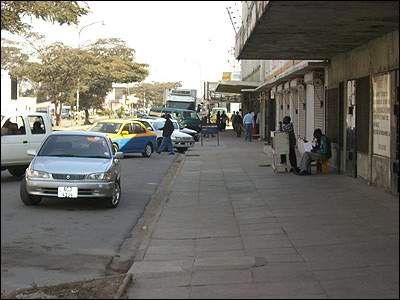
In town.
Meanwhile, Dave was working with Friday on the car. The evening before, after their day jobs and mostly by the light of a single electric bulb, Friday and his assistants had pulled the engine from the vehicle and dismantled it. Dave arrived Saturday morning to find it in pieces and neatly arranged on the slats of a wooden pallet. Friday informed him that, as he suspected, the cylinder head is warped. Dave and Friday dashed to town for parts and to get the cylinder machined. It's such a small town that they ran into the gals while they were there. Once the errands were completed, Friday returned to work on the vehicle and Dave joined the others.
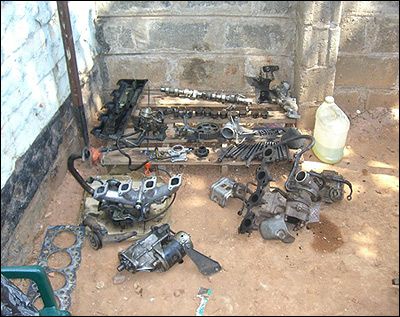
The engine pieces.
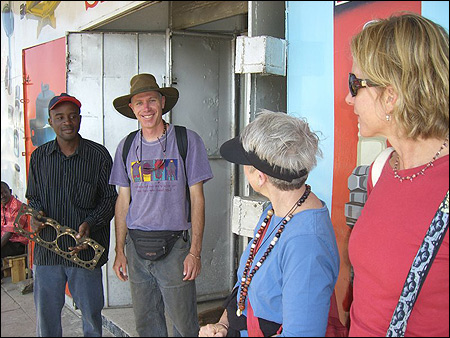
Left to right: Friday, Dave, Cheri, Tracey.
After lunch we repaired to the Michelangelo for email catch-up and ran into Fr. Augustine, the Prior from the Franciscan Friary, where we used to stay in Lusaka. It was wonderful to see him. We told him, very truthfully, that our only regret about flying directly into Ndola is that we no longer get to see him and the other friars.
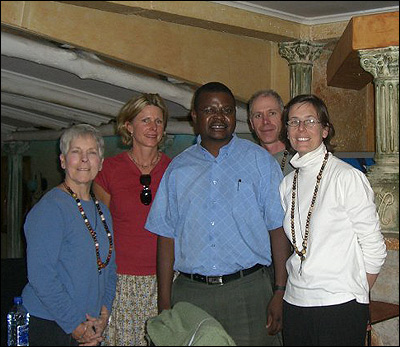
Left to right: Cheri, Tracey, Father Augustine, Dave, Jen
Midway through the afternoon, Jen left for the airport to pick up our guest, Dr. Heather Hindo, a pediatrician flying in for the weekend from Botswana.
Meanwhile, the guys (Tom, Troy, Bryn, and Brian) were having an adventure all their own. It all began when they hopped on a mini-bus to meet Theresa to do the week's shopping for Kantolomba. Here is what happened from several different points of view.
The day through Brian's eyes:
Today Tom, Troy, Bryn and I accompanied Theresa around town to purchase food for the next two weeks of the feeding program. With the Living Compassion vehicle in the shop, Theresa had to rely on the local network of mini-buses to get around to the various markets. The mini-buses are an affordable way to get around town, but they don't offer much storage space, and they only go as far as Lubuto, the compound just before Kantolomba. For Theresa to get the food back to the children, she would need some help; fortunately she had four "strapping young lads" on hand who were eager to see how the program works.
In the morning, Jen, Cheri, and I met Theresa downtown in front of the Savoy. From there we headed to the ATM across the street. As Jen and Theresa got out the funds for the day's shopping, we were joined by Tracy, Tom, Troy, and Bryn. We quickly hashed out the details of our plan for the day: The guys would go along with Teresa while Tracy, Jen, and Cheri would do some shopping for the apartment before starting work on their projects for the day. Having settled on our plan, we set off towards the nearest mini-bus station with Teresa in the lead.
Our first stop was Masala market. We hopped aboard the mini-bus and hurriedly piled in the back. For the first leg of the trip, we were only three to a row; we were enjoying the height of luxury by mini-bus standards. As we made more stops, we would work our way up to four per row with two in the front passenger seat. At the end of each row there is a small folding seat which, when occupied, blocks the people in the row behind from getting to the exit. These add a bit of comfort to the ride, but more than offset it with worries about what would happen if we were in an accident. We were relieved when we reached the market.
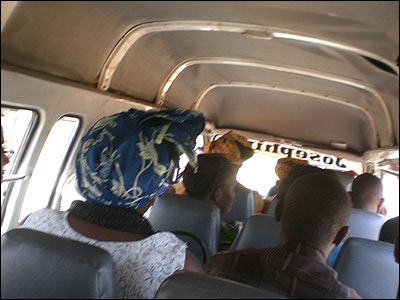
Inside the mini-bus
Once at the market, we headed toward the fish vendors. There, Theresa gave us a lesson in the basics of buying in the market. First, we did a brief tour around the area to see who was selling, what they had, and what prices they were asking. Once Theresa figured out the best deal, we received a lesson in negotiating a bulk purchase, Zambian style. Instead of a bulk discount, the sellers offer a "bonus" to those who buy over a certain amount. The size of the bonus container often becomes a hotly debated topic. After rounding up about twelve bags of small, sardine-type fish called kapenta, we made our way over to the other side of the market, where we were joined by Veronica, who helped us pick out beans. The bags of beans were both heavier and weaker than the bags of fish, which lead to many follies. Through trial and error, we learned that we could not carry them by their tops or rest them on our shoulders. The bean vendor kindly supplied us with fresh bags.
By this time we were already seriously encumbered, so Theresa decided to finish the shopping in the Lubuto market, as it is closer to Kantolomba. We hopped aboard another mini-bus, which was just as full as the last and now had to accommodate bags upon bags of beans and fish. It was a tight squeeze, but the ride was interesting. Along the way Theresa tried, with varying degrees of success, to teach me the names of the compounds along the route to Lubuto. Theresa also tried to convince the four of us that we would need help to carry the mealie-meal back to Kantolomba. For the moment we remained confident that we could do what needed to be done.
When we reached Lubuto, we were able to set down our burdens and relax for a moment in front of the milling company. As the milling employees brought out the mealie-meal, we started to understand why Theresa was skeptical of our ability to carry it into Kantolomba: In addition to the beans and fish already weighing us down, the four of us would need to transport two cases of milk, a bucket of cooking oil, and 500lbs of mealy meal. We were convinced! Still, we needed to be sure that we could at least lift the bags. As many an amused market-goer looked on, Bryn and I tested the weight of the bags. Small pockets of laughter broke out as Tom and I posed for a picture, each with a bag slung over one shoulder.
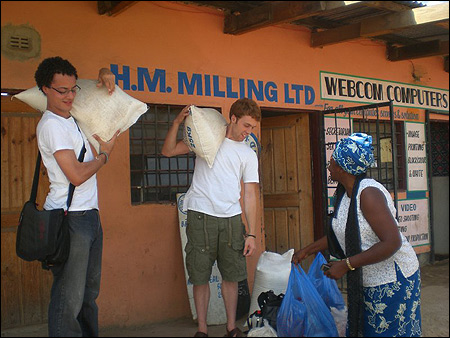
Left to right: Brian, Bryn, Theresa.
It was Troy, however, who brought down the house as he posed with a bag on each shoulder and one propped up on his head. By this time the spectacle of the "Ama-zungu" playing with the bags of mealie-meal had filled much of the market with laughter. Our fun was short lived; soon Theresa finished up in the milling office and put us back to work carrying milk, cooking oil, and sugar she purchased in the Lubuto market.
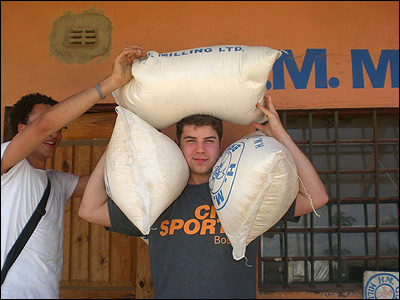
Troy testing his strength with sacks of mealie-meal.
With the shopping done we found ourselves faced finally with the dilemma of how we would get all our purchases to Kantolomba. Now that we had a sense of the enormousness of our burdens, we were far less enthusiastic about loading ourselves up and marching over the hill into the compound. In the end, we lucked out: we were able to hire a truck to haul the food for us. We walked to Kantolomba at a leisurely pace, encumbered only by our personal belongings.
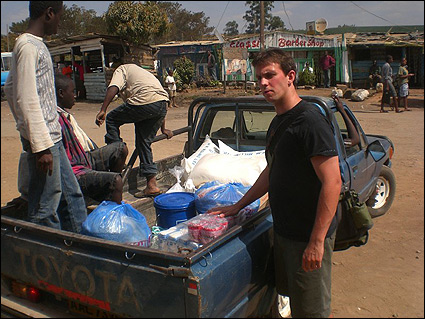
The truck to carry the goods to Kantolomba.
From Troy's point of view:
A week into our stay here, we got to spend our Saturday in the local markets of Lubuto and Masala, purchasing food for the Kantolomba Food Program. Theresa, who works for Living Compassion, and Veronica were our guides, translators, and comedians. They led us from the bus-taxi into the crowded alleys of the Masala market. Our first task was to find small fish called kapenta, a staple of the local diet.
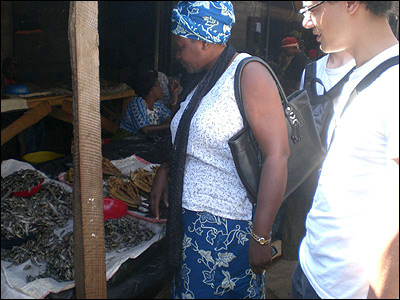
Theresa negotiating for kapenta.
After exchanging introductions and establishing a price, we moved on to compare and leverage prices with other shops in the market. Most people establish a consistent consumptive relationship with shops there to ensure a steady flow of revenue for the business and a bonus amount or discounted price for the purchaser. As we spent several minutes at each shop re-managing the weight distribution (a true art form!) of the fish and beans we had just bought, we seemed to provide onlookers with a great deal of amusement. We were obviously foreign and unpracticed in balancing such large amounts of food, and it just kept coming! We then went to the Lubuto market, where we set down the beans and fish, and some local women were kind enough to watch them while we went to buy more things for the Food Program. At the next booth, we piled our arms with vegetable oil, toilet paper, milk and salt for the next two weeks, only to return to our original trundles of food and be informed, humorously, that we also had to take ten 25kg of mealie-meal as well.
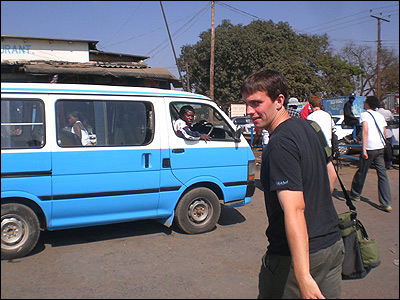
Tom is not so sure about boarding yet another mini-bus to get to Lubuto market.
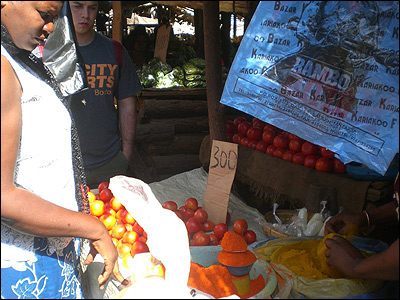
Theresa and Troy picking out tomatoes.
Despite my best efforts to convince the group that I could carry 3 mealie-meal bags at once, Veronica took action and arranged for a truck to carry the food up and down the looming hill and into Kantolomba. Although Tom, Bryn, Brian and I were disappointed that we couldn't fully help, usually 5 or 6 Kantolomban women help with the food and are adept at carrying such mealie-meal bags on their heads, we were relieved that on a hot winter's day (90 degrees F) we were brought on an interesting journey that will feed 100 Kantolomban school children and were able to make a few people laugh along the way.
Just as the guys and Theresa were finished unloading the groceries in Kantolomba, the water department arrived at the property to test the well capacity. Part of what you pay for when you contract to dig a well is a test that tells you how much water per minute the well can provide. Tom wrote an account of the scene:
When the men from the water department arrived, we weren't the only ones who realized the significance of what they were about to do. To test the capacity of the bore hole, the three men hooked up an electricity generator to a water pump, connected a 150ft rubber pipe, and dropped it down the bore hole.
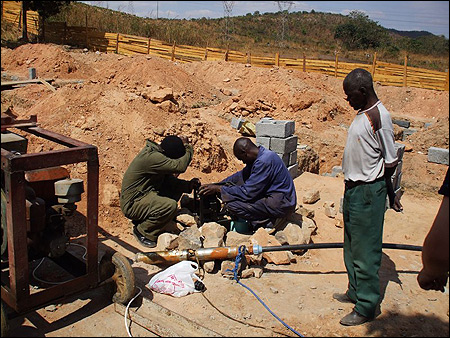
The Water Affairs workers preparing the temporary pump to test the well.
While Bryn and Troy played with the kids at the entrance to the property, I stood around the pipe waiting with video camera in hand. I wanted to film the first time that clean water made an appearance in Kantolomba. Living Compassion has done so much to improve living standards here, and in a few minutes "clean water" would be added to the list.
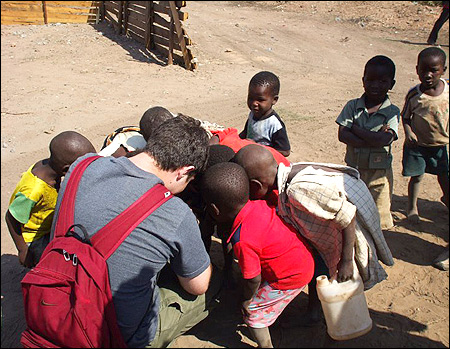
Troy showing photos to the children.
Sure enough, shortly after the generator whirred into action, a trickle of water dropped from the pipe. Theresa came running up the hill shouting "Water! Water" and within seconds a crowd of women and kids were huddled around the pipe. After a few moments of jubilation, the women scrambled for containers to save the water. The first bucket quickly overflowed. I remember that, rather than search for more containers, the women hugged each other again.
A historic day in Kantolomba.
The excitement faded, temporarily, when the water stopped running. After a tense 30 minutes, we asked the men from the water department what was happening. They explained that they had pumped the bore hole empty, and now they were waiting for it to refill. To test the capacity, they will restrict the flow of the water in such a way that the water leaving the pipe will exactly equal the water flowing into the bore hole.
Based on the results, Living Compassion estimates the bore hole will produce just over 6000 gallons of clean water a day. That's going to have an extraordinary impact on living standards in Kantolomba, but it's not enough. That evening, over dinner at the Living Compassion apartment, we brainstormed ideas for the next five bore holes.
In the evening we all met back at the flat to cook, eat, and exchange stories. So much happens in just one day in Zambia! Those who could still keep their eyes open after dinner did the dishes. The remainder waited until the glorious time came to taxi the short ride home to bed.
